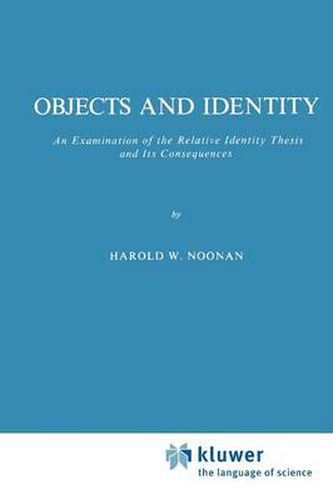Readings Newsletter
Become a Readings Member to make your shopping experience even easier.
Sign in or sign up for free!
You’re not far away from qualifying for FREE standard shipping within Australia
You’ve qualified for FREE standard shipping within Australia
The cart is loading…






This title is printed to order. This book may have been self-published. If so, we cannot guarantee the quality of the content. In the main most books will have gone through the editing process however some may not. We therefore suggest that you be aware of this before ordering this book. If in doubt check either the author or publisher’s details as we are unable to accept any returns unless they are faulty. Please contact us if you have any questions.
Identity has for long been an important concept in philosophy and logic. Plato in his Sophist puts same among those fonns which run through all others. The scholastics inherited the idea (and the tenninology), classifying same as one of the transcendentals , i.e. as running through all the categories. The work of Locke and l.eibniz made the concept a problematic one. But it is rather recently, i.e. since the importance of Frege has been generally recognized, that there has been a keen interest in the notion, fonnulated by him, of a criterion of identity. This, at first sight harmless as well as useful, has proved to be like a charge of dynamite. The seed had indeed been sown long ago, by Euclid. In Book V of his Elements he first gives a useless defmition of a ratio: A ratio is a sort of relation between two magnitudes in respect of muchness . But then, in definition 5 he answers, not the question What is a ratio? but rather “What is it for magnitudes to be in the same ratio? and this is the definition that does the work.
$9.00 standard shipping within Australia
FREE standard shipping within Australia for orders over $100.00
Express & International shipping calculated at checkout
This title is printed to order. This book may have been self-published. If so, we cannot guarantee the quality of the content. In the main most books will have gone through the editing process however some may not. We therefore suggest that you be aware of this before ordering this book. If in doubt check either the author or publisher’s details as we are unable to accept any returns unless they are faulty. Please contact us if you have any questions.
Identity has for long been an important concept in philosophy and logic. Plato in his Sophist puts same among those fonns which run through all others. The scholastics inherited the idea (and the tenninology), classifying same as one of the transcendentals , i.e. as running through all the categories. The work of Locke and l.eibniz made the concept a problematic one. But it is rather recently, i.e. since the importance of Frege has been generally recognized, that there has been a keen interest in the notion, fonnulated by him, of a criterion of identity. This, at first sight harmless as well as useful, has proved to be like a charge of dynamite. The seed had indeed been sown long ago, by Euclid. In Book V of his Elements he first gives a useless defmition of a ratio: A ratio is a sort of relation between two magnitudes in respect of muchness . But then, in definition 5 he answers, not the question What is a ratio? but rather “What is it for magnitudes to be in the same ratio? and this is the definition that does the work.